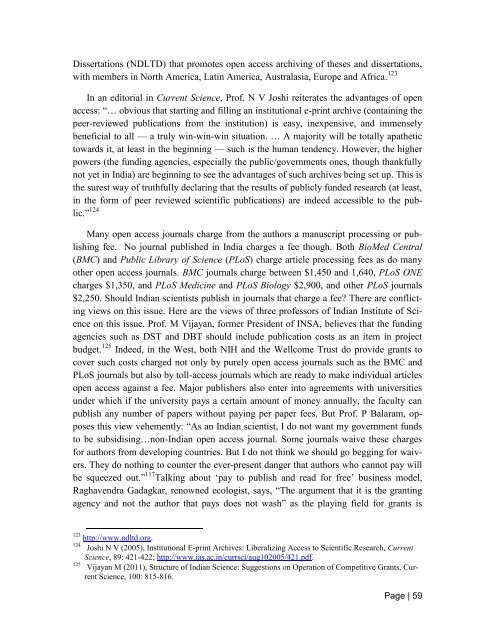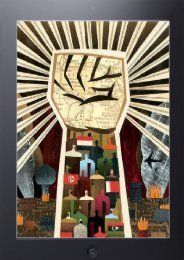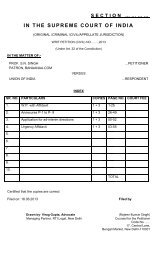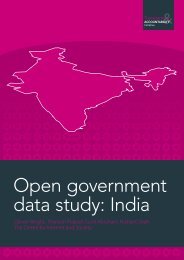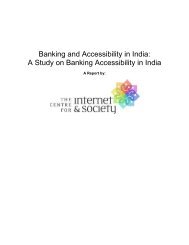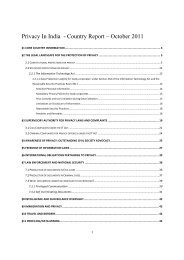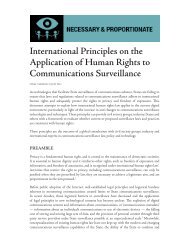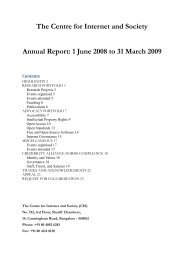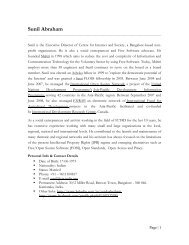Open Access to Scholarly Literature in India - Centre for Internet and ...
Open Access to Scholarly Literature in India - Centre for Internet and ...
Open Access to Scholarly Literature in India - Centre for Internet and ...
Create successful ePaper yourself
Turn your PDF publications into a flip-book with our unique Google optimized e-Paper software.
Dissertations (NDLTD) that promotes open access archiv<strong>in</strong>g of theses <strong>and</strong> dissertations,<br />
with members <strong>in</strong> North America, Lat<strong>in</strong> America, Australasia, Europe <strong>and</strong> Africa. 123<br />
In an edi<strong>to</strong>rial <strong>in</strong> Current Science, Prof. N V Joshi reiterates the advantages of open<br />
access: “… obvious that start<strong>in</strong>g <strong>and</strong> fill<strong>in</strong>g an <strong>in</strong>stitutional e-pr<strong>in</strong>t archive (conta<strong>in</strong><strong>in</strong>g the<br />
peer-reviewed publications from the <strong>in</strong>stitution) is easy, <strong>in</strong>expensive, <strong>and</strong> immensely<br />
beneficial <strong>to</strong> all — a truly w<strong>in</strong>-w<strong>in</strong>-w<strong>in</strong> situation. … A majority will be <strong>to</strong>tally apathetic<br />
<strong>to</strong>wards it, at least <strong>in</strong> the beg<strong>in</strong>n<strong>in</strong>g — such is the human tendency. However, the higher<br />
powers (the fund<strong>in</strong>g agencies, especially the public/governments ones, though thankfully<br />
not yet <strong>in</strong> <strong>India</strong>) are beg<strong>in</strong>n<strong>in</strong>g <strong>to</strong> see the advantages of such archives be<strong>in</strong>g set up. This is<br />
the surest way of truthfully declar<strong>in</strong>g that the results of publicly funded research (at least,<br />
<strong>in</strong> the <strong>for</strong>m of peer reviewed scientific publications) are <strong>in</strong>deed accessible <strong>to</strong> the public.”<br />
124<br />
Many open access journals charge from the authors a manuscript process<strong>in</strong>g or publish<strong>in</strong>g<br />
fee. No journal published <strong>in</strong> <strong>India</strong> charges a fee though. Both BioMed Central<br />
(BMC) <strong>and</strong> Public Library of Science (PLoS) charge article process<strong>in</strong>g fees as do many<br />
other open access journals. BMC journals charge between $1,450 <strong>and</strong> 1,640, PLoS ONE<br />
charges $1,350, <strong>and</strong> PLoS Medic<strong>in</strong>e <strong>and</strong> PLoS Biology $2,900, <strong>and</strong> other PLoS journals<br />
$2,250. Should <strong>India</strong>n scientists publish <strong>in</strong> journals that charge a fee? There are conflict<strong>in</strong>g<br />
views on this issue. Here are the views of three professors of <strong>India</strong>n Institute of Science<br />
on this issue. Prof. M Vijayan, <strong>for</strong>mer President of INSA, believes that the fund<strong>in</strong>g<br />
agencies such as DST <strong>and</strong> DBT should <strong>in</strong>clude publication costs as an item <strong>in</strong> project<br />
budget. 125 Indeed, <strong>in</strong> the West, both NIH <strong>and</strong> the Wellcome Trust do provide grants <strong>to</strong><br />
cover such costs charged not only by purely open access journals such as the BMC <strong>and</strong><br />
PLoS journals but also by <strong>to</strong>ll-access journals which are ready <strong>to</strong> make <strong>in</strong>dividual articles<br />
open access aga<strong>in</strong>st a fee. Major publishers also enter <strong>in</strong><strong>to</strong> agreements with universities<br />
under which if the university pays a certa<strong>in</strong> amount of money annually, the faculty can<br />
publish any number of papers without pay<strong>in</strong>g per paper fees. But Prof. P Balaram, opposes<br />
this view vehemently: “As an <strong>India</strong>n scientist, I do not want my government funds<br />
<strong>to</strong> be subsidis<strong>in</strong>g…non-<strong>India</strong>n open access journal. Some journals waive these charges<br />
<strong>for</strong> authors from develop<strong>in</strong>g countries. But I do not th<strong>in</strong>k we should go begg<strong>in</strong>g <strong>for</strong> waivers.<br />
They do noth<strong>in</strong>g <strong>to</strong> counter the ever-present danger that authors who cannot pay will<br />
be squeezed out.” 117 Talk<strong>in</strong>g about ‘pay <strong>to</strong> publish <strong>and</strong> read <strong>for</strong> free’ bus<strong>in</strong>ess model,<br />
Raghavendra Gadagkar, renowned ecologist, says, “The argument that it is the grant<strong>in</strong>g<br />
agency <strong>and</strong> not the author that pays does not wash” as the play<strong>in</strong>g field <strong>for</strong> grants is<br />
123 http://www.ndltd.org.<br />
124<br />
Joshi N V (2005), Institutional E-pr<strong>in</strong>t Archives: Liberaliz<strong>in</strong>g <strong>Access</strong> <strong>to</strong> Scientific Research, Current<br />
Science, 89: 421-422; http://www.ias.ac.<strong>in</strong>/currsci/aug102005/421.pdf.<br />
125<br />
Vijayan M (2011), Structure of <strong>India</strong>n Science: Suggestions on Operation of Competitive Grants, Current<br />
Science, 100: 815-816.<br />
Page | 59


